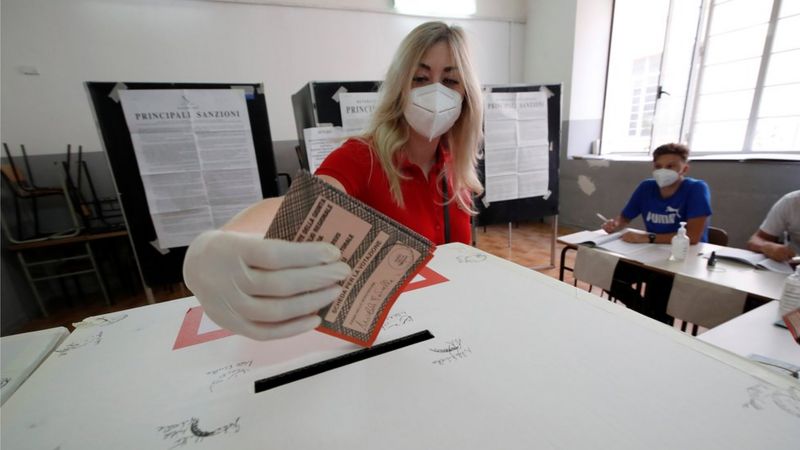ITALY VOTES TO SLASH PARLIAMENT BY A THIRD
Italians have voted in a referendum to cut the size of the country’s parliament by more than a third.
Almost 70% of people voted in favour of the change, with almost all votes counted.
The number of MPs in the lower house will be reduced from 634 to 400. The senate will also be downsized.
The referendum was pushed by the Five Star Movement, part of the governing coalition, which argued that the move would reduce costs.
It was held alongside several key regional elections, where the results were seen as a setback for far-right League leader Matteo Salvini and a boost for the centre left Democratic Party, which is part of Prime Minister Giuseppe Conte’s coalition government with the populist Five Star movement.
What the referendum result means
The total number of MPs and senators will be cut from 945 to 600. The change had already been pushed through parliament.
But it needed to be backed by a referendum because it amends the Italian constitution. The changes will have to be made before the 2023 election.
Foreign Minister Luigi Di Maio, a senior Five Star figure, described the result as “historic”.
“We can go back to having a normal parliament, with fewer privileges and 345 fewer seats,” he said.
Last October, Five Star said streamlining parliament would save the country €1bn (£918m) over 10 years.
However, critics argue the move will weaken the authority of parliament and deliver minimal cost-saving benefits.
What happened in the regional vote
Opposition League leader Matteo Salvini had been seeking big gains in the elections. But a right-wing coalition, led by Mr Salvini, who previously served as Italy’s interior minister, only managed to win the eastern region of Marche. It maintained control of two other regions.
The far-right Brothers of Italy party won the vote in Marche, and its leader Giorgia Meloni told local media it was a “great result”.
Mr Salvini had been hoping for a high-profile victory in Tuscany, which has been ruled by left-wing parties for more than five decades.
But the centre-left Democratic Party held on to three regions it already rules, including Tuscany and Puglia. Tuscany centre-left candidate Eugenio Giani said the centre left’s success there was an “extraordinary victory”.
In Veneto in the north-east, popular League president Luca Zaia won a crushing victory with 75.9% of the vote. He is seen as a potential party rival to Mr Salvini.





